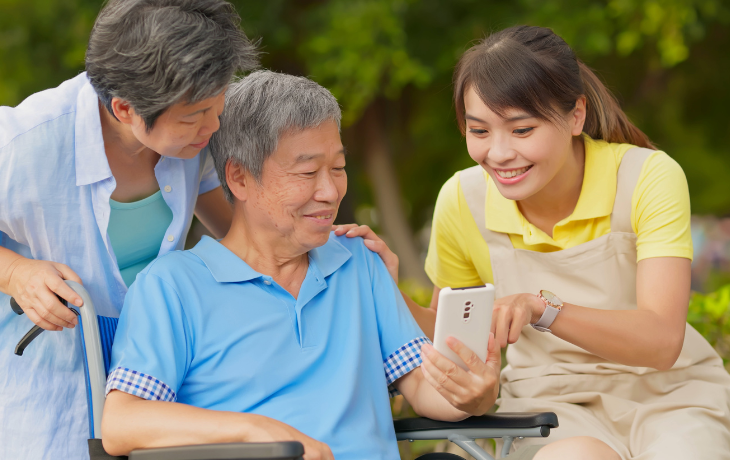The definition of “senior” refers to an individual who is 60 years of age or older. Most people think that seniors are no longer necessary or unable to contribute to the development of themselves and the surrounding society. However, this perception is wrong because there are still seniors who are still active and show devotion toward the development of the country and the nation. For example, Yang Berhormat Tun Dr. Mahathir Mohamad, His Excellency Tan Sri Datuk Seri Utama Dr. Zeti Akhtar Aziz, and so on. In line with that, the United Nations (UN) declared October 1st as World Senior Citizens Day, and the Malaysian government has also declared the day and held celebrations for seniors since 1992 (Jabatan Kebajikan Masyarakat, 2017). The purpose of this celebration is to create awareness and empathy for the well-being of the elderly as well as issues related to them, such as aging and abuse of the elderly. In addition, this celebration is also a day to commemorate and appreciate the contributions of seniors to society.
The elderly should be respected by the young, and it has become an obligation for the young to care for and obey their parents, especially as they get older. Therefore, our sensitivity, behaviour, and all forms of interaction and communication with those who are seniors need to be refined and polished in line with their ageing situation. Nevertheless, there are still limitations in the process of communication between different generations, such as sending and receiving incorrect information. Therefore, effective ways to communicate are important, especially when the seniors are already facing hearing problems. According to the Ministry of Health Malaysia (2014), when we want to communicate with those who have hearing problems, we should get their attention before starting a conversation so that they know we are talking to them. Also, we need to make sure the topic of the conversation is clear, then speak at a slow pace and face them. Visual cues such as hand gestures can be used to help them be more focused and understand the message conveyed in the conversations. Our speech rate will need to be slowed down a bit so that they can capture and understand the information that is being conveyed. We should also make sure there are no obstacles when we talk to them. This is because the message conveyed will be interrupted if we speak while eating, yawning, or when hands are placed to cover our mouth. In the event of a communication interruption, repeat the message delivered at a slower pace or reconstruct the sentence so that it is easier for them to understand. Avoid using complex or overly technical sentences when speaking to them. Most seniors with hearing problems will have difficulty understanding conversations in noisy environments. Therefore, make sure the environment around us is away from noises or sounds that can distract our focus and hearing.
When communicating with seniors, we must be sensitive and concerned with their age. Sometimes we forget that the generation gap is a factor in the occurrence of ineffective communication. When communicating with them, we need to make sure what is to be conveyed is the same as what is received. We should avoid using words that are so technical that they do not understand the information conveyed. Abdul Talib (2018) in Harian Metro suggested using drawing techniques, sketches, or actions that do not disturb the emotions of parents in communicating so that the information is understood. Apart from that, non-verbal communication is no less important to the seniors and should be in line with verbal communication. Non-verbal communication includes such as body language, appearance, facial mimicry or facial movements, touch, language speech, gaze, and body posture (Sharples, 2007). Non-verbal communication can be used to reinforce what is said orally (Mahbob & Ibrahim, 2017). If the goal cannot be achieved using verbal communication, then non-verbal communication such as conveying messages using writing or gestures can also help them to understand the message that needs to be conveyed (Ministry of Health Malaysia, 2014).
Prof. Dr. Farizah Hairi, in her article in The Malaysian Medical Gazette, has given some advice on ways to overcome this communication problem (Hidayah, 2020). She has listed five things that we need to focus on so that communication with the seniors is more effective. First, we should have patience in helping the seniors, especially when dealing with those who have physical, mental, and psychological limitations, such as hearing loss, slow movement, frequent forgetfulness, memory loss, irritability, stubbornness, grumpiness, and sensitivity. We should be empathetic and caring towards them and should put our position in their place. The Ministry of Health Malaysia (2014) also emphasised that communication with seniors is more sensitive and requires a lot of patience. This is because they are highly experienced individuals in life, therefore, their communication style has also evolved over the years. Individuals who communicate with seniors need to be sensitive to the issues they want to talk about. If they are still not ready, then we need to find a suitable time or talk about their favourite topic before discussing the specific issue (Abdul Talib, 2018).
Moreover, we should ask instead of giving instructions to them. For example, asking about their wants or foods they want today instead of instructing them to eat the same foods as us. In this way, we can allow them to make decisions together and respect their wishes (Hidayah, 2020). Abdul Talib (2018) also stated that seniors are easily offended and quite sensitive individuals. Therefore, showing respect can make them feel more comfortable and confident when communicating with us. Next, we should ask them a lot and avoid making assumptions. This way, we can identify their wishes and thoughts on an issue or matter (Hidayah, 2020). Communicating with them does not mean we should always talk. Sometimes we just need to be a good listener for them to express their thoughts and emotions. Sharing emotions with them can be an act of active communication. Elderly people who are less social due to health factors have fewer friends, which will make them feel the need for someone to sit together and listen to them (Abdul Talib, 2018).
In addition, we also need to be ready to assist them (Hidayah, 2020). Most of the time, they want to seek help from us, but they think that it may interfere with life, school, or work. So, we need to be open and listen more when giving them help in the things they ask us to do so that they do not feel neglected in life. Prof. Dr. Farizah Hairi also emphasised this advice in her article where we should give options to the seniors. This is because they still want to be independent in their lives and take care of themselves. Therefore, when communicating with seniors, we should give them some reasonable options to choose from. In addition to respecting their views, we can also empower and give them a sense of self-confidence (Hidayah, 2020).
In conclusion, effective communication with seniors is very important to avoid misunderstandings and trigger any feelings of dissatisfaction or anger. There is no denying that effective communication between different generations is quite a challenge. However, we can train ourselves until it is proficient and implemented by each individual.




